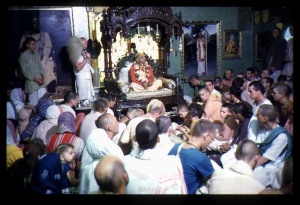SB 5.19.17-18: Difference between revisions
m (1 revision(s)) |
(Vanibot #0018 edit: make synonym terms in Sanskrit italic in SB - Vanisource) |
||
| Line 1: | Line 1: | ||
{{info | {{info | ||
|speaker= | |speaker=Śukadeva Gosvāmī | ||
|listener=King | |listener=King Parīkṣit | ||
}} | }} | ||
[[Category:Srimad-Bhagavatam - Canto 05 Chapter 19]] | |||
[[Category:Bhagavatam Verses Spoken by Sukadeva Gosvami - Vanisource|051917]] | |||
<div style="float:left">'''[[Srimad-Bhagavatam]] - [[SB 5|Fifth Canto]] - [[SB 5.19: A Description of the Island of Jambudvipa|Chapter 19: A Description of the Island of Jambūdvīpa]]'''</div> | |||
<div style="float:right">[[File:Go-previous.png|link=SB 5.19.16]] '''[[SB 5.19.16]] - [[SB 5.19.19]]''' [[File:Go-next.png|link=SB 5.19.19]]</div> | |||
{{RandomImage}} | |||
==== TEXTS 17-18 ==== | ==== TEXTS 17-18 ==== | ||
<div | <div class="verse"> | ||
etāsām apo bhāratyaḥ prajā nāmabhir eva punantīnām ātmanā copaspṛśanti | :etāsām apo bhāratyaḥ prajā nāmabhir eva punantīnām ātmanā copaspṛśanti | ||
:candravasā tāmraparṇī avaṭodā kṛtamālā vaihāyasī kāverī veṇī | |||
:payasvinī śarkarāvartā tuṅgabhadrā kṛṣṇāveṇyā bhīmarathī godāvarī | |||
:nirvindhyā payoṣṇī tāpī revā surasā narmadā carmaṇvatī | |||
:sindhur andhaḥ śoṇaś ca nadau mahānadī vedasmṛtir ṛṣikulyā | |||
:trisāmā kauśikī mandākinī yamunā sarasvatī dṛṣadvatī gomatī | |||
:sarayū rodhasvatī saptavatī suṣomā śatadrūś candrabhāgā | |||
:marudvṛdhā vitastā asiknī viśveti mahā-nadyaḥ | |||
</div> | </div> | ||
| Line 13: | Line 26: | ||
==== SYNONYMS ==== | ==== SYNONYMS ==== | ||
<div | <div class="synonyms"> | ||
''etāsām''—of all these; ''apaḥ''—water; ''bhāratyaḥ''—of Bhārata-varṣa (India); ''prajāḥ''—the residents; ''nāmabhiḥ''—by the names; ''eva''—only; ''punantīnām''—are purifying; ''ātmanā''—by the mind; ''ca''—also; ''upaspṛśanti''—touch; ''candra-vasā''—Candravasā; ''tāmra-parṇī''—Tāmraparṇī; ''avaṭodā''—Avaṭodā; ''kṛta-mālā''—Kṛtamālā; ''vaihāyasī''—Vaihāyasī; ''kāverī''—Kāverī; ''veṇī''—Veṇī; ''payasvinī''—Payasvinī; ''śarkarāvartā''—Śarkarāvartā; ''tuṅga-bhadrā''—Tuṅgabhadrā; ''kṛṣṇā-veṇyā''—Kṛṣṇāveṇyā; ''bhīma-rathī''—Bhīmarathī; ''godāvarī''—Godāvarī; ''nirvindhyā''—Nirvindhyā; ''payoṣṇī''—Payoṣṇī; ''tāpī''—Tāpī; ''revā''—Revā; ''surasā''—Surasā; ''narmadā''—Narmadā; ''carmaṇvatī''—Carmaṇvatī; ''sindhuḥ''—Sindhu; ''andhaḥ''—Andha; ''śoṇaḥ''—Śoṇa; ''ca''—and; ''nadau''—two rivers; ''mahā-nadī''—Mahānadī; ''veda-smṛtiḥ''—Vedasmṛti; ''ṛṣi-kulyā''—Ṛṣikulyā; ''tri-sāmā''—Trisāmā; ''kauśikī''—Kauśikī; ''mandākinī''—Mandākinī; ''yamunā''—Yamunā; ''sarasvatī''—Sarasvatī; ''dṛṣadvatī''—Dṛṣadvatī; ''gomatī''—Gomatī; ''sarayū''—Sarayū; ''rodhasvatī''—Rodhasvatī; ''saptavatī''—Saptavatī; ''suṣomā''—Suṣomā; ''śata-drūḥ''—Śatadrū; ''candrabhāgā''—Candrabhāgā; ''marudvṛdhā''—Marudvṛdhā; ''vitastā''—Vitastā; ''asiknī''—Asiknī; ''viśvā''—Viśvā; ''iti''—thus; ''mahā-nadyaḥ''—big rivers. | |||
</div> | </div> | ||
| Line 20: | Line 33: | ||
==== TRANSLATION ==== | ==== TRANSLATION ==== | ||
<div | <div class="translation"> | ||
Two of the rivers—the Brahmaputra and the Śoṇa—are called nadas, or main rivers. These are other great rivers that are very prominent: Candravasā, Tāmraparṇī, Avaṭodā, Kṛtamālā, Vaihāyasī, Kāverī, Veṇī, Payasvinī, Śarkarāvartā, Tuṅgabhadrā, Kṛṣṇāveṇyā, Bhīmarathī, Godāvarī, Nirvindhyā, Payoṣṇī, Tāpī, Revā, Surasā, Narmadā, Carmaṇvatī, Mahānadī, Vedasmṛti, Ṛṣikulyā, Trisāmā, Kauśikī, Mandākinī, Yamunā, Sarasvatī, Dṛṣadvatī, Gomatī, Sarayū, Rodhasvatī, Saptavatī, Suṣomā, Śatadrū, Candrabhāgā, Marudvṛdhā, Vitastā, Asiknī and Viśvā. The inhabitants of Bhārata-varṣa are purified because they always remember these rivers. Sometimes they chant the names of these rivers as mantras, and sometimes they go directly to the rivers to touch them and bathe in them. Thus the inhabitants of Bhārata-varṣa become purified. | Two of the rivers—the Brahmaputra and the Śoṇa—are called nadas, or main rivers. These are other great rivers that are very prominent: Candravasā, Tāmraparṇī, Avaṭodā, Kṛtamālā, Vaihāyasī, Kāverī, Veṇī, Payasvinī, Śarkarāvartā, Tuṅgabhadrā, Kṛṣṇāveṇyā, Bhīmarathī, Godāvarī, Nirvindhyā, Payoṣṇī, Tāpī, Revā, Surasā, Narmadā, Carmaṇvatī, Mahānadī, Vedasmṛti, Ṛṣikulyā, Trisāmā, Kauśikī, Mandākinī, Yamunā, Sarasvatī, Dṛṣadvatī, Gomatī, Sarayū, Rodhasvatī, Saptavatī, Suṣomā, Śatadrū, Candrabhāgā, Marudvṛdhā, Vitastā, Asiknī and Viśvā. The inhabitants of Bhārata-varṣa are purified because they always remember these rivers. Sometimes they chant the names of these rivers as mantras, and sometimes they go directly to the rivers to touch them and bathe in them. Thus the inhabitants of Bhārata-varṣa become purified. | ||
</div> | </div> | ||
| Line 27: | Line 40: | ||
==== PURPORT ==== | ==== PURPORT ==== | ||
<div | <div class="purport"> | ||
All these rivers are transcendental. Therefore one can be purified by remembering them, touching them or bathing in them. This practice is still going on. | All these rivers are transcendental. Therefore one can be purified by remembering them, touching them or bathing in them. This practice is still going on. | ||
</div> | </div> | ||
__NOTOC__ | |||
<div style="float:right; clear:both;">[[File:Go-previous.png|link=SB 5.19.16]] '''[[SB 5.19.16]] - [[SB 5.19.19]]''' [[File:Go-next.png|link=SB 5.19.19]]</div> | |||
__NOTOC__ | |||
__NOEDITSECTION__ | |||
Revision as of 01:38, 1 December 2017

A.C. Bhaktivedanta Swami Prabhupada
TEXTS 17-18
- etāsām apo bhāratyaḥ prajā nāmabhir eva punantīnām ātmanā copaspṛśanti
- candravasā tāmraparṇī avaṭodā kṛtamālā vaihāyasī kāverī veṇī
- payasvinī śarkarāvartā tuṅgabhadrā kṛṣṇāveṇyā bhīmarathī godāvarī
- nirvindhyā payoṣṇī tāpī revā surasā narmadā carmaṇvatī
- sindhur andhaḥ śoṇaś ca nadau mahānadī vedasmṛtir ṛṣikulyā
- trisāmā kauśikī mandākinī yamunā sarasvatī dṛṣadvatī gomatī
- sarayū rodhasvatī saptavatī suṣomā śatadrūś candrabhāgā
- marudvṛdhā vitastā asiknī viśveti mahā-nadyaḥ
SYNONYMS
etāsām—of all these; apaḥ—water; bhāratyaḥ—of Bhārata-varṣa (India); prajāḥ—the residents; nāmabhiḥ—by the names; eva—only; punantīnām—are purifying; ātmanā—by the mind; ca—also; upaspṛśanti—touch; candra-vasā—Candravasā; tāmra-parṇī—Tāmraparṇī; avaṭodā—Avaṭodā; kṛta-mālā—Kṛtamālā; vaihāyasī—Vaihāyasī; kāverī—Kāverī; veṇī—Veṇī; payasvinī—Payasvinī; śarkarāvartā—Śarkarāvartā; tuṅga-bhadrā—Tuṅgabhadrā; kṛṣṇā-veṇyā—Kṛṣṇāveṇyā; bhīma-rathī—Bhīmarathī; godāvarī—Godāvarī; nirvindhyā—Nirvindhyā; payoṣṇī—Payoṣṇī; tāpī—Tāpī; revā—Revā; surasā—Surasā; narmadā—Narmadā; carmaṇvatī—Carmaṇvatī; sindhuḥ—Sindhu; andhaḥ—Andha; śoṇaḥ—Śoṇa; ca—and; nadau—two rivers; mahā-nadī—Mahānadī; veda-smṛtiḥ—Vedasmṛti; ṛṣi-kulyā—Ṛṣikulyā; tri-sāmā—Trisāmā; kauśikī—Kauśikī; mandākinī—Mandākinī; yamunā—Yamunā; sarasvatī—Sarasvatī; dṛṣadvatī—Dṛṣadvatī; gomatī—Gomatī; sarayū—Sarayū; rodhasvatī—Rodhasvatī; saptavatī—Saptavatī; suṣomā—Suṣomā; śata-drūḥ—Śatadrū; candrabhāgā—Candrabhāgā; marudvṛdhā—Marudvṛdhā; vitastā—Vitastā; asiknī—Asiknī; viśvā—Viśvā; iti—thus; mahā-nadyaḥ—big rivers.
TRANSLATION
Two of the rivers—the Brahmaputra and the Śoṇa—are called nadas, or main rivers. These are other great rivers that are very prominent: Candravasā, Tāmraparṇī, Avaṭodā, Kṛtamālā, Vaihāyasī, Kāverī, Veṇī, Payasvinī, Śarkarāvartā, Tuṅgabhadrā, Kṛṣṇāveṇyā, Bhīmarathī, Godāvarī, Nirvindhyā, Payoṣṇī, Tāpī, Revā, Surasā, Narmadā, Carmaṇvatī, Mahānadī, Vedasmṛti, Ṛṣikulyā, Trisāmā, Kauśikī, Mandākinī, Yamunā, Sarasvatī, Dṛṣadvatī, Gomatī, Sarayū, Rodhasvatī, Saptavatī, Suṣomā, Śatadrū, Candrabhāgā, Marudvṛdhā, Vitastā, Asiknī and Viśvā. The inhabitants of Bhārata-varṣa are purified because they always remember these rivers. Sometimes they chant the names of these rivers as mantras, and sometimes they go directly to the rivers to touch them and bathe in them. Thus the inhabitants of Bhārata-varṣa become purified.
PURPORT
All these rivers are transcendental. Therefore one can be purified by remembering them, touching them or bathing in them. This practice is still going on.